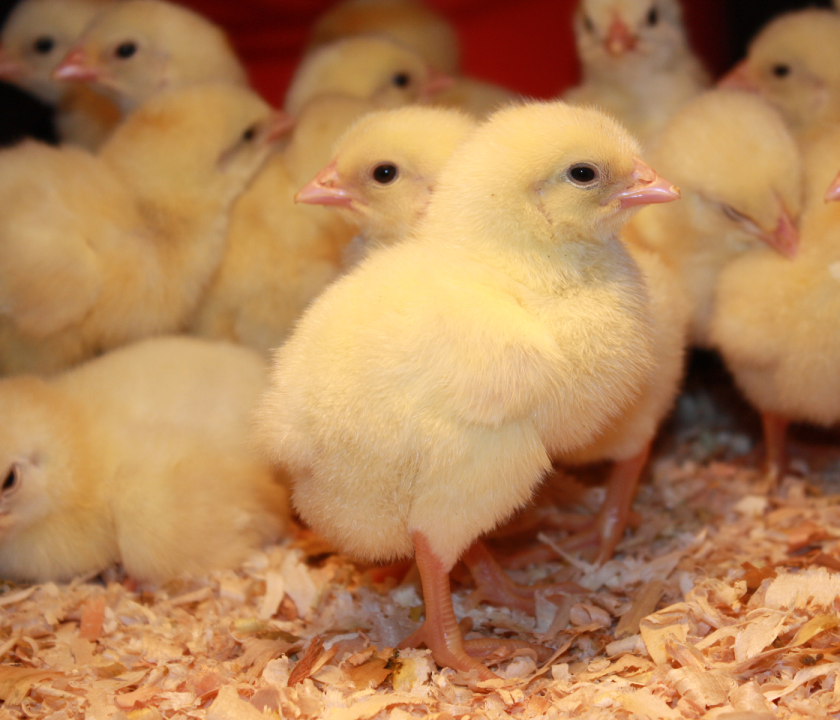Productivity and efficiency of modern poultry production, both for eggs and meat, have been significantly improved. However, modern birds have been genetically selected based on their growth potential at the expense of robustness and resilience to sanitary challenges.
- A poor immune repertoire and a quite immature microbiota make them very sensitive to inflammation leading to microbiota dysbiosis, performance drop and health degradation with higher infection risks.
Sensitivity to stress is a main issue in poultry production. Birds have to deal with many on-farm stressors such as high feed intake requirements; mycotoxins; variability in raw materials; heat stress; bacterial, viral or parasitic infections; farming management (bird density, antibiotic treatment, vaccinations, fasting, transport).
Despite extensive sanitary measures throughout the production chain, digestive pathologies remain a major and costly burden.
The intestine is a key organ on the front line of exposure to the sources of stress mentioned above and will respond to them by sending danger signals to the rest of the organism, in particular by triggering an inflammatory response.
While this response is part of a normal physiological process, inflammation can disrupt gut integrity and function when becoming chronic (Figure 1).
Figure 1. General overview of chronic intestinal inflammation disrupting gut integrity and function (Lallemand).
This is particularly true when the host is in contact with an antigen it has not previously been exposed to at an early age in order to “educate” its immune system (which is often the case with the almost sterile way we produce our modern birds), or when inflammation lasts too long during continuous exposure to a source of stress.
- These two situations will progressively lead to a chronic global inflammation state and birds will be less resilient to their environment.
The intestine can become then more fragile with a higher permeability, inducing the famous “leaky gut” syndrome and providing a gateway for some toxins and opportunistic bacteria such as E. coli, Salmonella or Enterococcus into systemic circulation, leading to secondary infections.
Any excessive inflammation response can be detrimental to the birds, resulting in dysbiosis, gut damage, poor intestinal absorption, poor performance, deterioration of animal well-being and even mortality.
Early education of day-old chick’s sensitivity to danger signals in the intestine is key in maintaining animal performance and health.
- Providing support during the earliest stage of life plays thus a critical role in ensuring good performance of modern poultry.
Successful early chick maturity at both gut microbiota and immune levels can be obtained after supplementation of OPTIWALL in feed. This postbiotic solution has been selected and optimized by Lallemand to offer a balanced, consistent, and guaranteed concentration of mannan-oligosaccharides and β-glucans.
Both in vitro studies and in vivo trials performed with this natural postbiotic by leading scientific experts provided evidence supporting the positive impact of OPTIWALL on gut health’s indicators with significant improvement of villi development and (villi height/crypt depth) ratio, immune organ weight, mucus layer thickness, protein deposition within carcasses and lower gut permeability, reducing thus the risk of bacterial translocation into the liver (Figure 2).
Birds supplemented with OPTIWALL show a higher resilience to different naturally occurring stressors, benefiting their zootechnical performance, as confirmed by a recent multi-analysis (Figure 2), presented during the XVI European Poultry Conference last June in Valencia by Barbé et al. (2024).
Figure 2. Key mechanistic and zootechnical benefits following OPTIWALL supplementation in broilers.
Similar zootechnical benefits of OPTIWALL supplementation were observed in a large scale field trial conducted in a broiler commercial farm (104,000 birds), in Belgium, in 2023. Performance indicators were improved while ensuring a high Return On Investment (Figure 3).
Figure 3. Example of zootechnical (Feed Conversion Ratio) and economical (Performance Efficiency Factor) results from a field trial conducted in a broiler commercial farm in Belgium (2023).
Furthermore, a challenge trial conducted with 4 groups (standard with no OPTIWALL, standard fed OPTIWALL, E.coli contaminated birds with no OPTIWALL, E.coli contaminated birds fed OPTIWALL), all under chronic heat stress from day 13-42 (>30°C for at least 6 hours per day), has shown a 2.5 times reduction in mortality rate in non-E.coli challenged conditions and a 5.5 times reduction in mortality rate under E.coli challenged conditions (Dhara et al., 2022).
Recent field trials performed in breeders and layers confirmed the beneficial effect of OPTIWALL feed supplementation in:
- supporting gut health and preventing therefore any counter-performance due to daily stressors,
- helping, through a specific reinforced protocol, to quickly reestablish a well-balanced microbiota when birds are challenged with secondary infections.
OPTIWALL contributes towards chick gut preparation and maturity, as well as increased resistance to the prevention of chronic inflammation, resulting in higher zootechnical performance, improving thus economic indicators.
In the context of antibiotic growth promoters’ replacement, OPTIWALL appears as an interesting strategy to improve zootechnical performance ensuring an enhanced Return On Investment, even more so when birds are faced with a challenge (infection, stress).
References available upon request.
PDF
